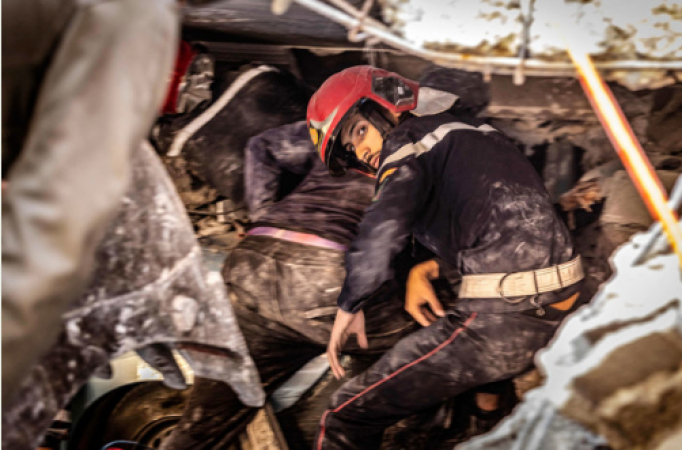
Rabat: In a display of resilience and commitment to international cooperation, the Moroccan government has declared its intention to move forward with the scheduled International Monetary Fund (IMF) and World Bank annual meetings, set to take place in Marrakech from October 9 to 15. This decision comes in the wake of a devastating earthquake that struck the country on a tragic Friday.
The earthquake, measuring a magnitude of 6.6, has already claimed the lives of over 2,500 individuals and left more than 15,000 others injured. Regrettably, this earthquake is the most potent to hit Morocco in over a century, leaving behind a trail of destruction and human suffering.
Despite the immense challenges posed by this natural disaster, the Moroccan government has determined that the meetings will proceed, albeit with significant modifications to their format and focus. In response to the catastrophe, the government plans to reduce the number of participants and shift the primary emphasis of the meetings towards providing essential assistance to the victims of the earthquake.
Also Read: Sweden's Shift Back to Traditional Education: Emphasizing Books and Handwriting
Both the IMF and the World Bank have expressed their solidarity with Morocco's decision to forge ahead with the meetings. They view this as an opportunity to address the economic repercussions of the earthquake and to coordinate international efforts in aiding the country's recovery.
The annual IMF-World Bank meetings are a cornerstone event in the global economic calendar. These gatherings convene finance ministers and central bankers from around the world, offering a platform to deliberate on the state of the global economy and to formulate strategies for international cooperation.
Morocco's unwavering commitment to hosting these meetings, despite the recent catastrophe, underscores the nation's resolve and dedication to fostering international collaboration. It also highlights the pivotal role these meetings play in tackling the challenges that confront the global economy.
Beyond the economic consequences, the earthquake has wrought significant human suffering. Thousands of individuals have been uprooted from their homes, and many continue to grapple with urgent needs for sustenance, clean water, and shelter. The Moroccan government has affirmed its commitment to providing assistance to the affected population, while expressing gratitude for the international support it has received.
In a show of solidarity, the IMF and the World Bank have pledged $1 billion in emergency aid to Morocco. Additionally, the United States has committed $50 million in humanitarian assistance, and several other nations have extended their support to the country in its time of crisis.
Also Read: Moscow Announces Victory for Putin's Party in Annexed Ukrainian Regions
The earthquake is undoubtedly a tragedy for Morocco. However, it also presents an opportunity for the nation to unite and rebuild. The IMF-World Bank annual meetings can serve as a vital component of this reconstruction process by providing a platform for international cooperation and support.
Morocco's decision to proceed with the IMF-World Bank meetings, despite the devastating earthquake, underscores the nation's resilience and unwavering commitment to international engagement. It sends a powerful message that even in the face of overwhelming adversity, the pursuit of economic cooperation and global solidarity remains a top priority.
The earthquake, which struck with a magnitude of 6.6, has left a profound impact on Morocco. The human toll, with over 2,500 lives lost and more than 15,000 individuals injured, is heartbreaking. It is a somber reminder of the unpredictable forces of nature and the immediate and long-term challenges they pose.
Yet, Morocco's determination to host the IMF-World Bank meetings is a testament to its enduring spirit. The decision to proceed, though scaled back and with a redefined focus, demonstrates the nation's resolve to not let adversity deter it from its commitments on the international stage.
The international community has rallied behind Morocco in the wake of the earthquake. Both the IMF and the World Bank have expressed their solidarity with the country's decision to move forward with the meetings. They recognize the significance of these gatherings in addressing the economic consequences of the disaster and facilitating global efforts to aid Morocco's recovery.
The annual IMF-World Bank meetings are a pivotal forum for economic discussions and policy coordination. Finance ministers and central bankers from diverse nations converge to assess the global economic landscape and chart a course for international collaboration. Despite the challenging circumstances, Morocco's decision to host these meetings reaffirms their importance in shaping the global economic agenda.
Beyond the economic repercussions, the earthquake has triggered a significant humanitarian crisis. Thousands of Moroccans have been displaced from their homes, leaving them in dire need of essentials such as food, clean water, and shelter. The Moroccan government has swiftly mobilized to provide assistance to those affected and has expressed deep appreciation for the international support received.
The IMF and the World Bank, in recognition of the urgency of the situation, have pledged $1 billion in emergency aid to Morocco. The United States has also committed $50 million in humanitarian assistance, joined by other nations offering their support. This collective response reflects the global community's willingness to stand by Morocco during its time of distress.
Also Read: Controversial Figure Abu Hamza Seeks Compassionate Release from US Supermax Prison, released
While the earthquake has left a devastating impact on Morocco, it also presents an opportunity for the nation to come together and rebuild. The IMF-World Bank meetings, even in their modified format, can serve as a platform for international cooperation and support in this recovery process.
Morocco's commitment to hosting these meetings, despite the immense challenges it faces, serves as a beacon of hope and resilience. It sends a clear message that in the face of adversity, the pursuit of economic cooperation and global solidarity remains unwavering. As Morocco navigates its path to recovery, the world watches, ready to offer assistance and support in its journey toward healing and rebuilding.